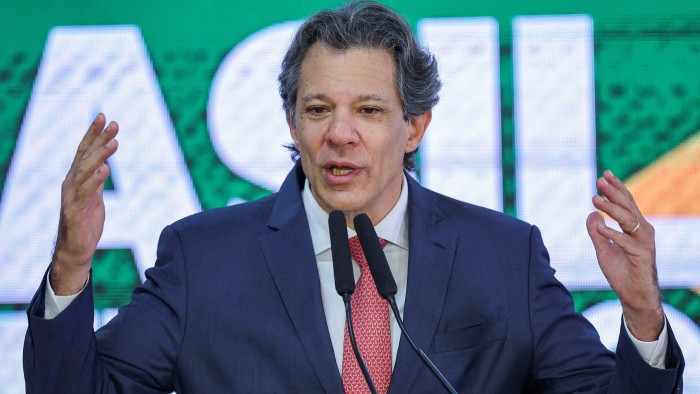Unlock the Editor’s Digest for free
Roula Khalaf, Editor of the FT, selects her favourite stories in this weekly newsletter.
Brazil has reached an impasse with the US over the record tariffs it has imposed on the South American nation, its finance minister Fernando Haddad has said, insisting a solution depends more on Washington’s willingness to resolve the issue.
The US imposed 50 per cent tariffs on most Brazilian exports after President Donald Trump accused the country of conducting a “witch-hunt” against his ally, far-right former president Jair Bolsonaro, and demanded his supreme court trial be halted.
“The US is trying to impose on Brazil a solution which is constitutionally impossible,” Haddad said in an interview at an FT Live-Times Brasil/CNBC conference in São Paulo. “An impasse has been reached, it’s a request which cannot be fulfilled.”
Haddad noted that under Brazil’s constitution, the supreme court is independent of the government.
The minister had scheduled a virtual meeting with US Treasury secretary Scott Bessent last week to discuss the tariffs but Washington cancelled the call. The Treasury department declined to comment.
Shortly afterwards Bessent appeared in a photograph posted on social media with Eduardo Bolsonaro, the former president’s son. The Brazilian lawmaker has been lobbying for months in Washington for sanctions against the judges trying his father on charges of organising a military-backed coup in January 2023.
“We knew that the [Brazilian] far-right might mobilise in the US,” Haddad said of his failed virtual meeting with Bessent.
Asked about how the impasse could be resolved, Haddad said: “To have a channel [for dialogue], you need an opening on this side and an opening on the other side. The one on this side is open . . . it depends more on the other side than on our side.”
Luiz Inácio Lula da Silva, Brazil’s leftwing president, has been posting nationalistic videos and rejecting what he calls “unacceptable interference” in Brazil’s sovereignty since the US announced the tariffs. His popularity has risen since the confrontation began, but business leaders are anxious for the government to engage with the White House.
A poll published by the Folha de São Paulo newspaper last weekend showed 35 per cent of respondents blamed Lula for the dispute, with 22 per cent blaming Jair Bolsonaro and 17 per cent his son Eduardo. Just 15 per cent blamed the judge overseeing the case, Alexandre de Moraes.
“What President Lula has been saying is this: ‘I don’t feel any willingness to talk on [the part of] the other side,’” Haddad said. “Whether you like Lula or not, he is possibly the head of state who knows the most people in the world. He talks to everyone.”
Asked how Brazil could diversify its trade relations amid growing US protectionism, Haddad said he believed the EU and the South American Mercosur bloc would soon finalise a long-awaited landmark trade deal.
“By the end of the year, I believe it will be possible,” said the politician charged with overseeing Latin America’s biggest economy.
The EU and Mercosur, which includes Argentina, Brazil, Paraguay and Uruguay with Bolivia in the process of entering the bloc, concluded talks at the end of last year on the blockbuster trade deal, which would create a market of 700mn people.
However, it must still overcome resistance to the pact from France and other nations, which are worried about the impact on European farmers, and obtain final approval from the EU’s 27 member states.
Haddad said Lula had spent as much time dealing with his French counterpart Emmanuel Macron as with fellow members of the Brics group of developing nations, of which Brazil is a founding member.
“President Lula manages the Brics [relationships] as much as he does the European Union agreement,” said Haddad.
“[He] has been much more vocal with Macron — much more so. The president has been talking to Macron almost quarterly for two years.”
#Brazil #deadlocked #tariffs #finance #minister


